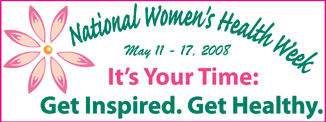 The Society for Women’s Health Research encourages women to take charge of their health throughout the year. But for those women who have fallen behind with regular exams and screenings, National Women’s Health Week (May 11-17, 2008) is the perfect time to take charge, take action, and get healthy. The Society encourages women to take action by participating in “National Women’s Check-Up Day” on May 12, the Monday of National Women’s Health Week. A woman can participate by taking time on May 12 to schedule at least one preventative health screening within the next 90 days.
The Society for Women’s Health Research encourages women to take charge of their health throughout the year. But for those women who have fallen behind with regular exams and screenings, National Women’s Health Week (May 11-17, 2008) is the perfect time to take charge, take action, and get healthy. The Society encourages women to take action by participating in “National Women’s Check-Up Day” on May 12, the Monday of National Women’s Health Week. A woman can participate by taking time on May 12 to schedule at least one preventative health screening within the next 90 days.
Women require several screenings depending upon their age and risk factors for specific diseases. The Society has created a list of “Five Key Health Tests” every woman needs to have at various stages of her life:
1) Blood pressure and cholesterol screening for heart disease prevention
• Heart disease is the leading cause of death among women in the U.S.
• A woman should get her first cholesterol test at age 20 and get retested every five years, or more often if your cholesterol is over 200.
2) Pap test for cervical cancer prevention
• A woman should have her first Pap test within three years of the onset of sexual intercourse or at age 21.
• If you are younger than 30, it is recommended you have the HPV test if your Pap Smear test detects abnormal cells or is unclear.
• If you are 30 or older, experts recommend you have the HPV test at the same time as your Pap test.
3) Mammogram to detect breast cancer when it is most treatable
• Women 40 and older should get a mammogram every 1-2 years.
• If there is a history of breast cancer in her family, a woman should get her first mammogram 10 years before her relative was diagnosed.
4) Colonoscopy to prevent and detect colon cancer
• Colon cancer is the third most common cancer in women
• Women should have a colonoscopy at least once every 10 years beginning at age 50.
5) Annual skin examination to prevent and detect skin cancer
• Melanoma is the most common cancer among women ages 25-29.
• It affects women primarily on back of calves, top of the thighs, abdomen and chest.
A woman can take action by signing up for the National Women’s Health Week “My Check-Up Day Pledge.” For more information on National Women’s Health Week and National Women’s Health Check-Up Day, visit http://www.womenshealthresearch.org
Source: Newswise
